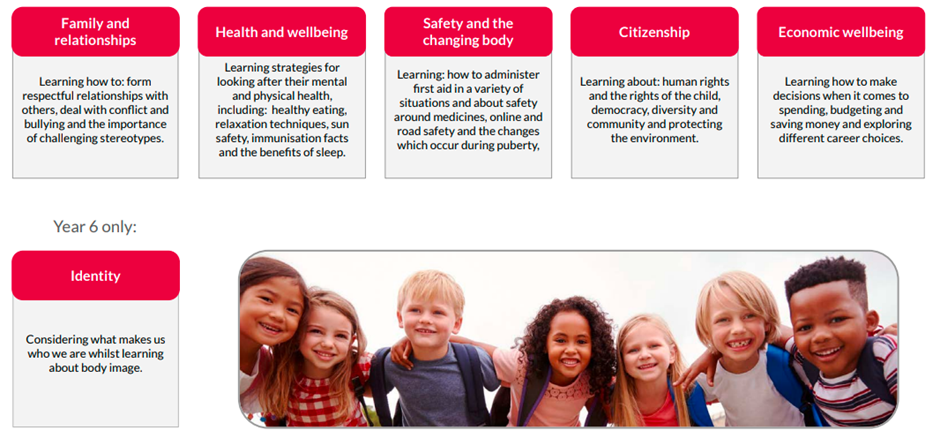PSHE

PSHE at Cloverlea
Intent
PSHE Education is a planned programme of learning through which children and young people acquire the knowledge, understanding and skills they need to manage their lives – now and in the future.
The National Curriculum states that every school needs to have a broad and balanced curriculum that
- promotes the spiritual, moral, cultural, mental and physical development of pupils at the school and of society, and
- prepares pupils at the school for the opportunities, responsibilities and experiences of later life’
- promotes British values.
At Cloverlea, we aim to promote pupils’ personal social and emotional development, as well as their health and well-being. Our intention is to provide children with the knowledge and skills they need to lead confident, healthy and independent lives. We aim to help them understand how they are developing personally and socially, and assist to them to cope with many of the social, moral, spiritual and cultural issues that are part of growing up. In doing so, we provide pupils with the knowledge, understanding, attitudes, values and skills they need in order to reach their potential as individuals and within the community.
Implementation
Curriculum
At Cloverlea Primary School, we follow the 'Kaow' PSHE curriculum. Kapow is a comprehensive and PSHE Education programme for the whole primary school from EYFS through to Year 6. The scheme of work follows a structured, spiral curriculum, enabling skills and knowledge to be built upon each other from year to year.
Lessons are categorised into five key areas, which are returned to in each group, making pupil's prior and future learning clear and progressive.
Progression is broken down into the following key areas:
- Families and relationships – learning how to recognise and form positive relationships with family and friends; identifying how to deal with conflict and bullying.
- Health and wellbeing – learning strategies for maintaining physical and mental health, including hygiene, exercise, healthy eating, sleep and self-awareness.
- Safety and the changing body – learning how to stay safe in a variety of online and offline situations; what to do in an emergency; naming parts of the body; distinguishing between appropriate and inappropriate physical contact; identifying the physical and emotional changes of puberty.
- Citizenship – recognising the importance of rules; caring for others and the local environment; learning about rights, responsibilities and the importance of participation in community life.
- Economic wellbeing – exploring what money is, ways to earn it and how to take care of it.

Enrichment
At Cloverlea we also participate in a range of other activities such as ‘National Anti-Bullying Week’ and ‘World Mental Health day’. We try to support local charities and children are encouraged to run fund raising and awareness initiatives for charities that they feel passionate about. Some classes have been involved in participating in singing events for the local community. Older children also support younger age range classes with activities and learning and ‘Helping Hands’ pupils help others during lunchtimes.
Zones of Regulation
At Cloverlea Primary School, we recognise the importance of promoting positive mental health and emotional wellbeing to our pupils, staff & families. By implementing the Zones of Regulation curriculum we aim to teach our pupils to identify emotions in themselves and others and provide them with bank of strategies to help regulate their emotions and improve their wellbeing. Stand-alone lessons are taught and links to Zones of Regulation are also built into Kapow lessons where appropriate. For more information, please see the 'Zones of Regulation' section under the 'School Information' section of our school website.
SEND/Disadvantaged
We strive to ensure that all pupils access the full PSHE curriculum. These pupils will be supported to provide them with full accessibility to the knowledge-rich PSHE curriculum.
Impact
Pupils will:
• Have a sense of purpose
• Value self and others
• Form relationships
• Make and act on informed decisions
• Communicate effectively
• Work with others
• Respond to challenge
• Be an active partner in their own learning
• Be active citizens within the local community
• Explore issues related to living in a democratic society
• Become healthy and fulfilled individuals
Content and Progression of Skills
